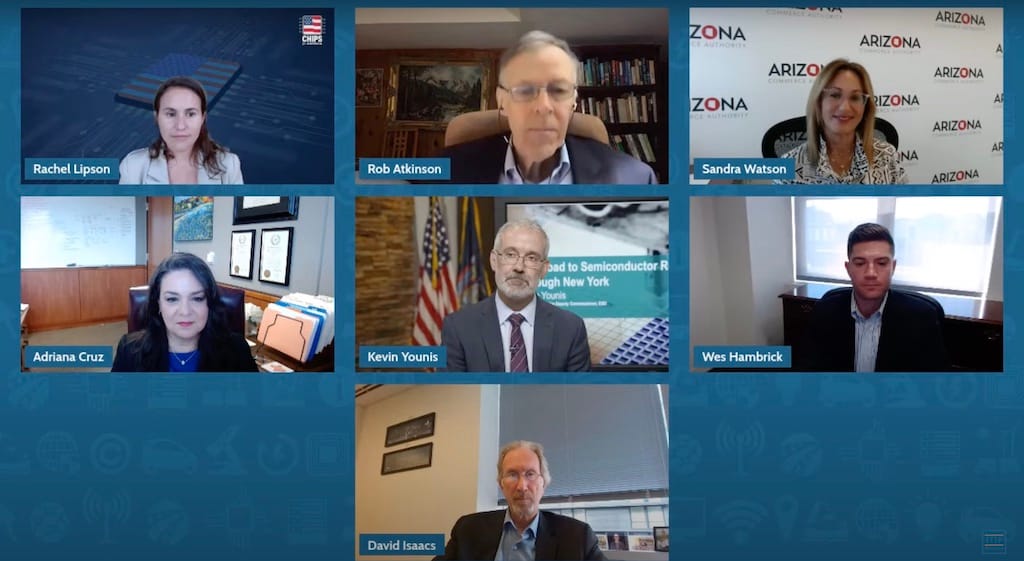States Flex Job Creation Following CHIPS Act Passage, Panelists Say
The three states showcased efforts at growing the semiconductor industry.
Ryan Barba

WASHINGTON, September 11, 2023 — Officials from Arizona, New York and Texas touted at a webinar Wednesday an increase in manufacturing and jobs as a result of the passage of the CHIPS and Science Act in July 2022.
Information Technology and Innovation Foundation, a non-profit organization promoting information technology and supportive of the CHIPS Act, highlighted recent progress in the semiconductor industry.
“We launched a partnership with Plug and Play and we created a new office here,” Sandra Watson, president and CEO of the Arizona Commerce Authority said.
Watson noted the significance of her state’s collaboration with the leading innovation platform and their commitment to manufacturing. Additionally, Arizona launched two of six new advanced manufacturing training centers to work with industry partners.
“[This is] to ensure that they’ve got the talent and the workforce they need,” Watson said.
In New York, the creation of the Office of Strategic Workforce Development focuses on expanding the manufacturing and technology workforce in the state, “including the semiconductor industry,” said Kevin Younis, chief operating officer and executive deputy commissioner of Empire State Development.
The office has awarded more than $24 million to 39 projects for training purposes impacting 9,000 people for more than 300 different businesses.
The state has also invested $200 million to their Focused Attraction of Shovel-Ready Tracts New York grant program. It was designed to assure that New York “has a variety of shovel ready sites across the state,” Younis said.
The state’s investment to FAST NY is to establish sites to attract “high-tech manufacturing, particularly semiconductor manufacturing, warehousing, distribution and logistics businesses to the state to jumpstart New York’s shovel-readiness and increase the state’s attractiveness to large employers.”
Younis also acknowledged the creation of the Governor’s Office of Semiconductor Expansion, Management, and Integration that will oversee Micron’s $100 billion investment which will build the world’s largest chip fab in Central New York.
GO SEMI will assist local community by coordinating workforce development and community investments as well as create and support policies to appeal to the “semiconductor industry, supply chain, and skilled workers to New York.”
Younis added that Micron’s decision to invest in central New York was due to the company recognizing a “rich pool of diverse talent encompassing communities underrepresented in technology jobs” and offering future Micron employees many benefits that included potential partnerships with “local K-12 programs, community colleges, and institutions for top engineering and technical talent.”
In preparation for the passing of the CHIPS Act, Gov. Greg Abbott created the Texas Semiconductor Task Force, which was an idea to lead “state government, the semiconductor industry, higher education institutions, and workforce stakeholders to best position Texas for the future,” said Wes Hambrick, federal affairs director in the governor’s office.
Hambrick stated that Texas has been leading regular conversations with “important stakeholders” in the state and have been in consistent communication with partners at the Commerce Department and CHIPS Program office to further discussions about where state partnership is needed to “successfully secure the supply chain.”
He added that Abbott advised that “state funding be available to leverage federal funding” that was provided by the CHIPS Act.
“This included state support for workforce training programs, higher education, research, infrastructure improvements, tax incentive, and other funds, among many other items that the Legislature worked on,” Hambrick said.
The efforts showcased by the three states demonstrated their commitment toward growing the semiconductor industry and support for the CHIPS Act. An advancement only made possible by taking initiative and collectively working together at the state and federal level.
“This is going to require a whole of society call to arms and call to action across industry colleges, government, the private sector, nonprofits, partners, unions,” said Rachel Lipson, senior policy advisor for the White House’s CHIPS program office. “It’s really going to require all of us coming together.”








Member discussion